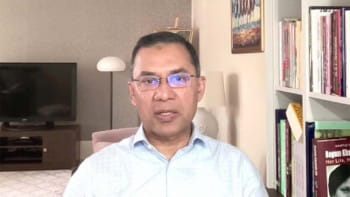Making children smile

When Mostakur Rahman Alim and Sarower Nimmy saw pus-like liquid oozing out of their daughter Elma's ear four years ago, they had no idea what was in store for them.
Clueless, the parents from capital's Jatrabari took their one-year-old to a doctor the next day. The doctor gave them some medicine and Elma Akter gradually recovered within a few days.
But the story did not end there.
A few days later, they noticed Elma was having hearing issues. As she turned one and a half years old, they realised that she started losing her ability to hear. She also faced difficulties in uttering a few words she used to pronounce well before.
“It seemed our whole world turned upside down. Our Elma tried to talk but couldn't,” said Mostakur, an electrician by profession.
Elma was born a normal child with beautiful blue eyes. Her birth had brought a world of happiness to her parents. She is the reason that her grandparents reconciled with her parents after a long time, as they got married without their consent.
While growing up, Elma could hear and speak using small words like “ma” and “ba”.
“After the incident [of liquid coming out of her ear], we discovered that she is losing her hearing ability gradually. She also stopped saying the words she used to utter and started communicating with us by using her arms,” said her mother Sarower Nimmy, a homemaker.
The couple left no stone unturned to get their daughter cured. They shuttled from one hospital to another and met a number of doctors, but to no avail.
Then one day they came to know about a surgery -- Cochlear Implant -- from a doctor of Samorita Hospital in the capital. Upon further enquiry, they learned about the surgery and its costs, which the electrician father could not afford.
“We're told that the surgery would cost around Tk 15 lakh. We even thought of selling our organs for Elma's treatment,” said Sarower.
Finally, their wish came true as Elma has recently undergone the Cochlear Implant surgery at the Bangabandhu Sheikh Mujib Medical University (BSMMU) at a very low cost. Her parents had to pay only Tk 15,000.
COCHLEAR IMPLANT
The surgery is being done under a special initiative taken by the social welfare ministry which is implementing it as a programme titled “Development of Cochlear Implant Programme” at the BSMMU. The ministry bears the larger portion of the cost while parents need to pay only Tk 15,000 to 50,000, depending on their monthly income.
The programme was launched in 2010 to treat people, mostly from low-and middle-income families, with hearing impairments. Children are the main focus of the programme as the surgery is more effective for children than for adults.
The ministry usually publishes advertisements in newspapers seeking applications from parents whose children suffer from the disability and the people who want to take the treatment. After getting applications, they analyse those and select patients, said the ministry officials.
A total of 48 children and six adults had been operated on in the first phase of the programme that continued until 2013. Most of the treated children can hear and talk, and are now studying in schools and leading a normal life, said doctors.
In the second phase that started in 2014, 40 children and an adult were chosen for the treatment after the selection process. Elma and some other children had already been treated as the surgeries began this year.
So far, the government had spent Tk 20 crore in the programme which is still continuing. This year, the government has decided to allocate Tk 7 crore as yearly budget following a rise in the demand for the treatment, said ABM Shafiqul Haidar, deputy chief (planning) of the ministry.
“We want to thank the government for taking such a great initiative, as it helped us cure our daughter. We can't express our happiness that Elma will be able to hear us again,” Elma's father Mostakur told this newspaper.
Doctors at BSMMU said Elma would be able to hear and talk within a year of the surgery by following a rehabilitation process.
Abul Hasnat Joarder, director of the Cochlear Implant Programme, said, “We have set a cochlear implant device, known as bionic ear, inside her [Elma's] ear. After three to four weeks, we will set an external device at the outer side of her ear. It will work along with the implanted device, and then she will begin to hear.”
Then she will be given an auditory-verbal therapy, two days a week for a year, which will help her learn language, he said. To start talking within a year, Hasnat said, she would have to practice at home and take the therapy regularly.
Hasnat, also a professor at BSMMU, said hearing impairment can be cured, and children with severe hearing impairment can also be treated if their cochlear implant surgery is done within five years of their birth.
“It is better to do the surgery when patients are 2-3 years of age, as their language learning ability reduces with age,” he said.
The doctor said Elma is lucky to have her surgery done within time.
Every year, around 2,600 children are born with hearing disability in the country, and approximately six percent of children (aged 0-14 years) suffer from mid-range hearing impairment, according to a 2013 survey by the World Health Organisation.
According to the survey, 9.6 percent of the country's population and 15 percent of world population suffer from different types of hearing complications.


 For all latest news, follow The Daily Star's Google News channel.
For all latest news, follow The Daily Star's Google News channel. 



Comments